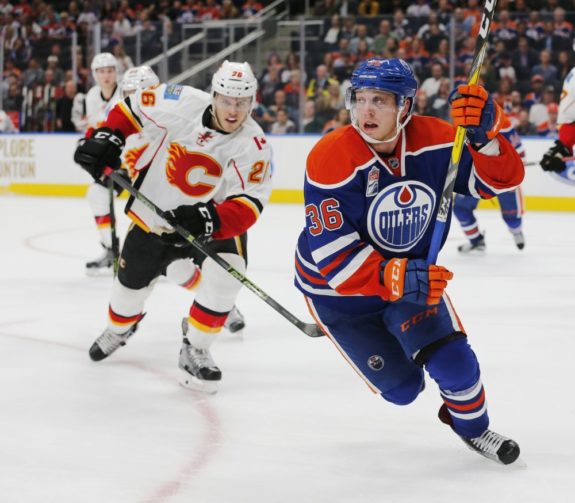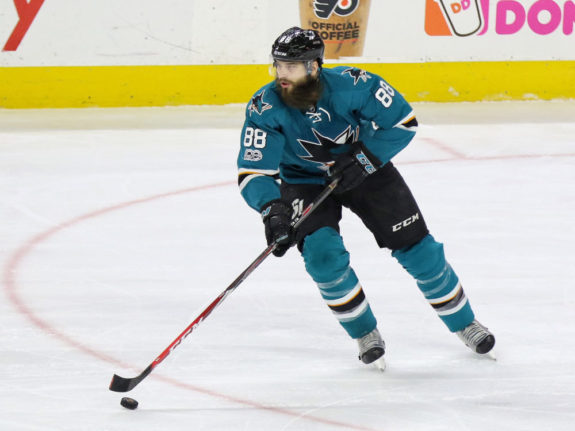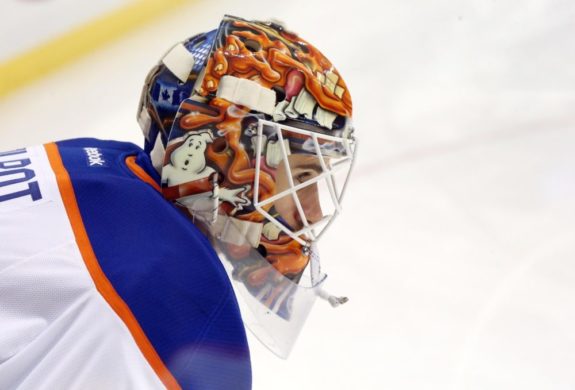Well, the Edmonton Oilers played their first playoff game in 11 years, and they left with a lot of hard lessons to take in. Chalk it up to a giant learning experience, but the Oilers were completely outplayed, out coached and out disciplined by an experienced San Jose Sharks team. With the Sharks faltering down the stretch, many forget that this is nearly the same team that went to the Stanley Cup Finals just one year ago.
The Oilers learned that the hard way in Game One and trail the series 1-0 heading into Game Two on Friday night. The Oilers came out with all sorts of jump and youthful exuberance, but the Sharks weathered the storm and let the Oilers play right into their hands and capitalized on Edmonton’s mistakes.
It was inexperience for the Oilers, and after seeing the effort the Sharks played with in Game One, it’s a hard lesson of the sheer compete level and effort it takes to win a playoff game. If Edmonton wants to make this a series, they’ll have to make some significant adjustments the rest of the way.

More Responsibility, Fewer Penalties
Edmonton was the definition of undisciplined in Game One. If the Oilers are going to pull ahead in this series, they’ll need to limit the time they spend in the penalty box. In Game One, six of the seven penalties the Oilers took were stick infractions — in other words, lazy plays that are inexcusable in the playoffs.
They played nearly 25% of regulation on the penalty kill, and it became difficult to build any sustained momentum afterward. It’s a recipe for disaster against a strong puck possession team like the Sharks.
|
LACK OF DISCIPLINE PART OF PROBLEM FOR OILERS |
||
| PERIOD | PLAYER | PENALTY |
| 1 | Jordan Eberle | Tripping (against David Schlemko) |
| 1 | Zack Kassian | High Sticking (against Joe Pavelski) |
| 1 | Drake Caggiula | Hooking (against Patrick Marleau) *PPG* |
| 2 | Eric Gryba | Elbowing (against Logan Couture) |
| 2 | Drake Caggiula (2) | High Sticking (against Joe Pavelski) |
| 3 | Patrick Maroon | Holding (against M-E Vlasic) |
| 3 | Milan Lucic | Slashing (against Timo Meier) |
The Oilers also struggled to break out of the zone cleanly. Their zone exits were telegraphed by the defense and well scouted by the Sharks. San Jose caught the Oilers in the neutral zone far too often and forced the Oilers into turnovers.
Part of this was the jitters and nerves that come with most Oilers playing their first playoff games. They second guessed plays they could’ve easily made in the regular season when the pressure wasn’t on.
Now that the first one is out of the way, the Oilers will need to settle back into the play that led them to a second-place finish in the Pacific Division.
Edmonton needs a more controlled game in Game Two, and build upon the things they did well. The forwards burned the San Jose defenders when they went wide and were able to move the puck pretty well into the slot. The Sharks showed a tendency to leave a gaping hole in the middle of their defensive zone, and that’s where Edmonton will score goals.
The other key to winning Game Two is getting in the shooting lanes in front of Sharks goaltender Martin Jones who doesn’t track pucks very well. It’s also nearly impossible to win a playoff game when you have just nine shots combined from the second period to overtime.
San Jose found a way to isolate Connor McDavid by committee with Marc-Édouard Vlasic, Justin Braun and Joe Pavelski virtually triple-teaming Edmonton’s star. The Sharks dared the Oilers to come up with any offense with everyone
|
OILERS FORWARD LINES |
||
| Patrick Maroon | Connor McDavid | Leon Draisaitl |
| Milan Lucic | Ryan Nugent-Hopkins | Jordan Eberle |
| Drake Caggiula | Mark Letestu | Zack Kassian |
| Benoit Pouliot | David Desharnais | Iiro Pakarinen |
* Does not include potential game day changes and healthy scratches (Matt Hendricks, Jujhar Khaira)
Despite getting two early goals from Oscar Klefbom and Milan Lucic, the Oilers secondary scoring is going to have to step up the way San Jose’s did for them to survive. Peter DeBoer was able to roll all four lines against the Oilers, whereas the Oilers lack of forward depth got exposed early in the series.
Ryan Nugent-Hopkins, Jordan Eberle, Benoit Pouliot and David Desharnais are going to have to start contributing soon. It’s not the time to panic, but the urgency come playoff time means Edmonton will need an improved effort sooner rather than later.

The Brent Burns Factor
Going into this series no player has got more coverage and hype than McDavid, but it was Brent Burns who was arguably the best skater for both teams in Game One. Burns led all players with eight shots and had 27:34 in ice-time. For Edmonton to win this series, they will need to learn how to contain a player of Burns’ caliber.
When you talk about raising compete level in the playoffs, Burns was a prime example. He controlled the tempo when he was on the ice, and he plays at such a high pace from start to finish it can make life miserable for the opposition.
|
BRENT BURNS STATS |
|||||||||||
| GP | G | A | PTS | +/- | PIM | PPG | GWG | TOI | S | PTSPG | |
| Season | 82 | 29 | 47 | 76 | 19 | 40 | 8 | 6 | 24:51 | 320 | 0.93 |
| Playoffs | 1 | o | o | o | 1 | 2 | o | o | 27:34 | 8 | o.oo |
If Edmonton continues to let Burns get away from them and continue to drag the Oiler forwards into the deep end with a pace they’re unable to keep up with, this series is going to be over before we know it. The Oilers took it to Burns in the first period but he weathered the storm and persevered to create his own space and opportunities.
After Burns had stood up Kassian behind the Sharks net in the second, it looked as if Edmonton let up on him, stopped challenging and pressuring him. It’s one thing to respect your opponent, and it’s another to let him walk all over you.
Although he was held pointless, you’d never tell by the way he contributed and created scoring chances for the Sharks. If Edmonton wants to pull ahead in this series, they’ll have to play the body heavily on Burns and the rest of the Sharks defense for the duration of the game.
When Burns is given too much respect and space on the forecheck, it’s too easy for him to transition and make that first outlet pass on the breakout.
Increasing the physicality and punishment on the forecheck is going to be a major key going forward. If the Oilers continue the status quo, they’re dead in the water. If the forecheck improves, they’ll force the puck and cause some hesitation for Shark defenders, like Burns, on puck retrievals.
Talbot & Parting Shots
If Cam Talbot didn’t play as unreal as he did in Game One, this could’ve been an absolute blowout after the first intermission. The Oilers failed to show their goaltender any real support in the defensive zone, and it got worse as the game went on. The Sharks were free to roam the Oiler zone without much consequence.

Imagine Talbot having a subpar performance, and the score could’ve been 5-2 or even 7-2 with some of the quality chances the Sharks got. Edmonton needs to tighten up defensively, reduce rebounds and limit the blind passes up the middle that led to several scoring opportunities for the Sharks.
|
SHARKS ARE ROLLING FOUR DEEP |
||
| Melker Karlsson | Logan Couture | Joe Pavelski |
| Jannik Hansen | Tomas Hertl | Mikkel Boedker |
| Joonas Donskoi | Patrick Marleau | Joel Ward |
| Marcus Sorensen | Chris Tierney | Timo Meier |
On zone exits the wingers were caught flat footed on most breakouts and with the swing guy out of position. Edmonton will need better puck support up and down the ice to beat the Sharks neutral zone coverage.
That said, there’s an onus on Todd McLellan to do a better job line matching against DeBoer and the Sharks. For a team that had home ice advantage, you likely wouldn’t have known it from seeing how San Jose got the better of most matchups.
With the last playoff appearance being in 2006, there’s a natural tendency to compare this version of the Oilers with the one that went to the Stanley Cup Finals. This team might have more skill, but that 2006 team was tenacious, and won games because they worked harder than their opponents.
It’s a valuable lesson for these young Oilers because hard work beats talent when talent doesn’t work hard. If they need further clarification, they should watch some game tape from that 2006 Cinderella run, or even look at the Sharks pay the price in Game One.
It’s not over yet, it’s a long series, and the Oilers can still bounce back to win this series. Learning experiences aren’t always fun, but that adversity builds championship teams.